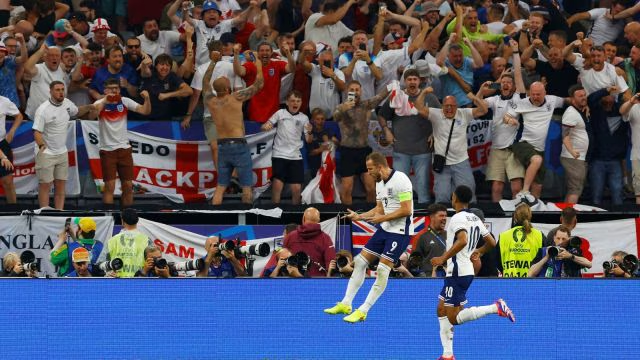Sometimes, a pause helps. Three minutes after Xavi Simons’s solo-run goal slipped England into pandemonium, Jude Bellingham suffered a blow to the head, colliding with Jerdy Schouten. As the support staff attended to Bellingham, England’s Kieran Trippier, a warrior according to his coach, snarled at his teammates, exhorting them to pick up the shattered pieces of their self-belief.
Trippier rushed to Declan Rice, from whom Xavi Simons had snatched the ball, and offered a warm embrace. He wrapped an arm of comfort around Phil Foden, whose struggles had embodied England’s passivity.
Something suddenly stirred. The England team that resumed after the break was a different animal, a beast that relentlessly tossed and ripped the Dutch stranglehold apart with relentless energy. England buzzed and fizzed into life, delivering 35 minutes of sustained and sweeping magnificence. The repelling parts finally fused and burned to produce carnage.
Two minutes later, Phil Foden composed a clever free-kick that Declan Rice could have flicked towards the goal rather than passing back. Harry Kane trapped a ball on the turn and cracked a shot from 30 yards. Bukayo Saka, England’s most penetrative forward throughout the entire tournament, warped through tight alleys into expansive spaces. He schemed the contentious Harry Kane penalty, swanned into the box, and took his shot, but the blocked attempt bounced to Kane. The VAR check, drama, penalty, and equalizer threw the game into the melodrama zone.
This sequence seemed to galvanize England’s attack. Harry Kane regained his mobility, pace, and positioning instinct. Bukayo Saka was a little globe of fire, swerving past the Dutch backline like a gust of breeze, cutting into his preferred inside right channels. This movement created space behind him, where Phil Foden would slash in. The Manchester City forward, often a lightning rod for criticism and the finest example of Gareth Southgate’s capacity to stifle creative footballers, found new freedom and impact on the game.
But Phil Foden bristled with fuming energy, his off-the-ball movements a treatise for fledgling footballers to study. He ran with purpose, passing with the clarity of the summer sun. He nearly snatched the lead, prodding the ball past his club-mate Nathan Ake and goalkeeper Bart Verbruggen, only for Denzel Dumfries’s clearance off the line to deny him. Phil Foden’s link-up with another Manchester City colleague, Kyle Walker, oozed reassurance too. Kyle Walker served Bukayo Saka and Phil Foden with a stream of overlapping runs, cutting open the Dutch backline. Phil Foden relished the free role, shuttling in and out of the flanks with Jude Bellingham filling the pockets of space he left behind.
Phil Foden was woefully unfortunate not to enter the scoresheet. He channeled his inner Lamine Yamal and packed a curler into the far corner from 25 yards. Had the shot not cannoned off the woodwork (Yamal’s also hit the post but deflected into the net), this would have been as spectacular a goal as the Spaniard’s, as he struck the shot on the half-run.
By incorporating these key phrases—Xavi Simons solo-run goal, Jude Bellingham head injury, Kieran Trippier leadership, Declan Rice assist, Phil Foden creativity, Harry Kane 30-yard shot, Bukayo Saka penetration, Harry Kane penalty, VAR check drama, England vs. Netherlands match, Gareth Southgate strategy, relentless energy of England, melodrama zone of the match, criticism of creative footballers, Kyle Walker overlapping runs, Jude Bellingham tactical positioning, Phil Foden near-goal, Lamine Yamal comparison.







